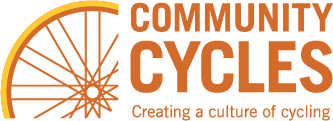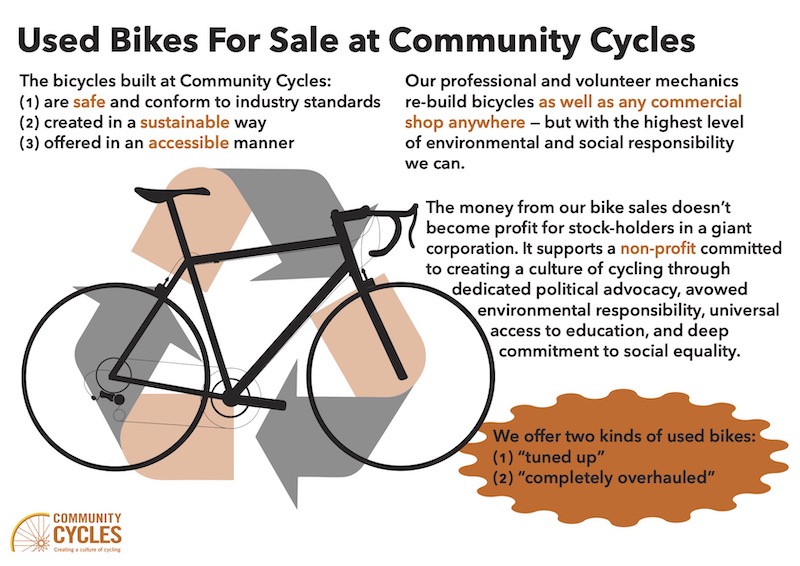Community Cycles is known throughout the Boulder/Denver metro area as the place to donate old bikes, in any condition. From that, we are known as *the* place to buy a quality refurbished bike. But what happens in between and why is that important?
Mission
Community Cycle’s mission is to create a culture of cycling through advocacy, education and access. Here we’ll take a look at how a simple bike donation supports our mission of access to bicycles as a safe sustainable means of transportation.
When you donate a bike, our professional and volunteer mechanics keep these three thoughts in mind when evaluating whether to keep or recycle the bike:
- we create bicycles that are safe and conform to industry standards
- we create bikes in sustainable ways
- we offer bicycles for transportation in an accessible manner
Some bikes are unable to be brought up to safety standards and are recycled to keep them out of the landfill. The rest are either “tuned-up” or “completely overhauled”, and then sold to fund our programs.
What is a Tune-up?

Some bikes are donated to us in relatively good condition and require only mechanical adjustment. In that case, we:
- Attend to all parts of the bicycle carefully to see whether anything is damaged by corrosion or impact. If so, we recycle it and substitute a new part, primarily from our vast array of used parts (which are also for sale to you, at dramatically low prices!) or new parts.
- Typically we replace most rubber parts, such as tires, tubes, and brake pads. These tend to degrade over time, regardless of the way the bike’s used.
- We also frequently replace metal parts of the drivetrain such as chains and cassettes. These endure a lot of wear and tear on any bike, but especially with Colorado’s dust, which makes an excellent grinding compound when combined with chain lubricant.
- Finally, we often replace saddles, pedals and grips or bar tape. These are the contact points between you and your bike, and we want to ensure that the relationship is a comfortable and pleasant one!
- With the bike’s structural and functional integrity assured, we work with the various sub-systems so that they conform to bike-industry practices. In particular, our bikes meet the standards set by Barnett Bicycle Institute (now U of Q), United Bicycle Institute, and the Park Tool School. Many of our professional and volunteer mechanics are, as a matter of fact, graduates of these institutions. Among other things, this means that:
- All bearings – the front and rear hubs, headset, and bottom bracket – are set so that they spin smoothly only in the way they were meant to. There’s a fine balance between friction and free play, and we take the time to find it. The result is a longer-lasting and safer bike.
- All cables – which control the front and rear brakes as well as the front and rear derailleurs – have their tension set and their housings configured so that they operate smoothly and consistently. Hydraulic systems are bled.
- The brakes and derailleurs themselves have been aligned and adjusted so that you’ll be able to brake and shift your bicycle with complete confidence and without a second thought.
- Both wheels have been radially and laterally trued. A straighter wheel is also a stronger wheel, which is also a safer wheel.
- All accessories – racks, fenders, bottle cages, and reflectors, for example – have been installed with care and double-checked for safety.
- The entire bike is then gone over again by a second mechanic using a checklist with the same criteria, for quality assurance.
- All told, a tune-up takes between 1 and 2 hours of intense and concentrated work. At the end of this process, you can expect the highest degree of mechanical perfection the bike’s initial condition allows.
What is an Overhaul?

Some bicycles are donated to us in pretty rough shape, or were a little more special to begin with – customs, rare models, antiques &c. – so they merit more of our attention. Specifically, these bikes call for complete disassembly, cleaning, and reassembly. In this case, we:
- As with a tune-up, first attend to all parts of the bicycle carefully to see whether anything is damaged by corrosion or impact. If so, we recycle it and substitute a new part, primarily from our vast array of used parts (again, also for sale to you, at dramatically low prices!) or new parts.
- We then completely disassemble the bike down to the bare frame, which is cleaned and polished while all parts are soaked and scrubbed in a solvent bath.
- All bearings in the front and rear hubs, headset and bottom bracket are replaced, if possible, using high-grade bearings and fresh grease. They are then adjusted to factory-specified bearing pre-loads. The result is longer-lasting bearings, which means a less-expensive, better-performing and safer bicycle for you.
- All pivots in the front and rear brakes and front and rear derailleurs are re-lubricated. The brakes and derailleurs have been aligned and adjusted, as with a tune-up. But since they’ve been cleaned, you’ll have lower maintenance costs in the long run: dirt is the primary reason for component wear.
- Typically, as with a tune-up, we replace most rubber parts, such as tires, tubes, and brake pads.
- We also frequently replace metal parts of the drivetrain such as chains and cassettes.
- In an overhaul, however, we replace the cables and housing as well. This ensures you will spend less money over time maintaining the bike, as the control systems are completely clean and perfectly adjusted. Dirt, again, is the primary cause of control-system issues.
- Finally, we usually replace saddles, pedals, and grips or bar tape while overhauling a bicycle. Again: these are the contact points between you and your bike, so we want to ensure that the relationship is a comfortable and pleasant one. When overhauling classic bicycles we also strive to maintain period-correctness where possible and applicable.
- In an overhaul the entire bike, as with a tune-up, is then gone over again by a second mechanic using a checklist with the same criteria.
- All told, a complete overhaul takes between 4 and 6 hours of intense and concentrated work. At the end of this process, you can expect the highest degree of mechanical and aesthetic perfection the bike’s initial condition allows. You can also expect your bike to last longer, and cost less, in the long run than a bike that’s received a tune-up.
Your Bike Donation is Important
Whether your donated bike is tuned-up or overhauled, it’s a concentrated effort to bring out the best in the bicycle. In turn, the person who purchases it will have the best possible ride to keep them moving throughout the city – to work, school, errands and recreation.
Our professional and volunteer mechanics re-build bicycles as well as any commercial shop anywhere, – but with the highest level of environmental and social responsibility we can.
We appreciate when you purchase a used bike from Community Cycles – it keeps bicycles out of the landfill, plus the money from our bike sales doesn’t become profit for stockholders in a giant corporation. It supports a non-profit dedicated to creating a culture of cycling through political advocacy, avowed environmental responsibility, universal access to bikes and bike education, along with a deep commitment to social equality.

